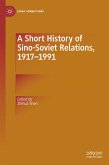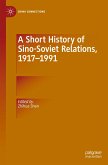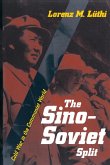Beginning with a detailed analysis of all aspects of Sino-Soviet relations from November 1963 through November 1965, this summary takes up where the author's The Sino-Soviet Rift left off and, like it, includes the text of, or key excerpts from, the main documents of the period. This book first deals with Khrushchev's unsuccessful attempt to reactivate the collective expulsion or condemnation of the Chinese by an overwhelming majority of the world Communist movement, the Chinese gains arising from his failure, and the resultant growth of pluralistic tendencies among his supporters. After Khrushchev's fall, the book turns to the more indirect and therefore more successful policies of Brezhnev and Kosygin against the Chinese. Beginning with the seventh Chinese Comment, the documentation includes Togliatti's Testament and the April 1964 Romanian Central Committee Statement and concludes with the October 27, 1965, Pravda restatement of post-Khrushchev foreign policy and the November 11, 1965, Chinese attack on Moscow's united front policy on the Vietnam crisis.








